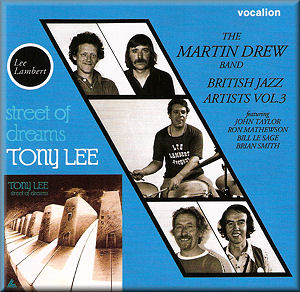British Jazz Artists Vol. 3
1. No More Blues
2. Re-Rev
3. A Child is Born
4. Strut Your Stuff
5. Another Star
6. Steelbender
7. Easy Life
8. Sound Down
Martin Drew - Drums
John Taylor - Piano
Ron Mathewson - Acoustic bass, bass guitar
Bill Le Sage - Vibes
Brian Smith - Soprano sax, tenor sax
Chris Fletcher - Percussion (tracks 1, 4, 5, 7)
Street of Dreams
1. Li’l Darlin’
2. Loss of Love
3. Street of Dreams
4. Dick’s Mood
5. Love for Sale
6. My Funny Valentine
7. On Green Dolphin Street
Tony Lee - Piano
Tony Archer - Bass
Martin Drew - Drums
Tony Uter - Congas
After the Second World War, British rhythm sections - and especially
drummers - got a reputation for stodginess. This certainly seemed
justified when some British rhythm sections were contrasted with the
light airiness of their American equivalents. It took a while for
this notoriety to be undermined and eventually dismissed, thanks to
the work of such evidently talented drummers as Phil Seamen and Martin
Drew. Martin was good enough to be chosen to play in the Oscar Peterson
Trio - a notoriously competitive environment, in which Drew built
up a strong reputation for technique and rhythmic drive.
Those qualities are already audible in the first CD of this double
album. It is a reissue of a 1977 album in which Martin was joined
by a stellar line-up of British jazzmen. The tunes were arranged by
Bill Le Sage, a highly experienced vibist-cum-pianist. He sticks to
the vibes here, leaving the piano role to John Taylor, another of
Britain's finest.
The CD opens with a propulsive version of No More Blues, which
includes a well-recorded double bass solo from Ron Mathewson and the
first of some dynamic drum solos from Martin Drew. Brian Smith's soprano
sax sounds rather sour in Milt Jackson's Re-Rev but John Taylor
contributes a shimmering piano solo and Bill Le Sage adds a well-constructed
solo on the vibes. Brian Smith repairs his reputation with some tender
tenor sax on A Child is Born, which also benefits from a thoughtful
vibes solo by Le Sage.
Strut Your Stuff is a groovy funk number. John Taylor switches
to electric piano for Another Star - one of Stevie Wonder's
many catchy compositions - with good vibes from Bill Le Sage, who
also excels in the following blues, Steelbender. Tom Scott's
Easy Life is marred by Brian Smith's dubious intonation on
soprano sax but it is rescued by another educated solo from Bill Le
Sage. Smith again utters somewhat tortured cries in the concluding
Sound Down but Ron Mathewson's double bass sounds splendid
in his unaccompanied solo, which John Taylor eventually joins for
some out-of-tempo games. If British rhythm sections were once scorned,
there is nothing to criticise about the piano, bass and drums here.
Ron Mathewson's sinewy bass is particularly good at underpinning every
track.
Like Martin Drew, pianist Tony Lee could challenge the Americans
at their own game. The opening track of the second CD (recorded in
1979) shows how much he learnt from the likes of Oscar Peterson, and
an unaccompanied section pays a clear debt to Art Tatum. He takes
a daring step by playing Li'l Darlin' at a much faster tempo
than Count Basie's original but it works surprisingly well - and he
throws in a new riff between each section of the tune. His two-fisted
approach was indubitably stimulating, and the excitement is ably reinforced
by Martin Drew and bassist Tony Archer.
Lee plays electric piano on Loss of Love, a neglected Henry
Mancini ballad, and Tony's debt to the Americans is manifest in Street
of Dreams, which could easily be mistaken for a performance by
Erroll Garner. Tony Uter's generally unnecessary conga drums even
remind one of the period when Garner superfluously augmented his trio
with a conga player, as if he couldn't produce enough rhythm on his
own!
Dick's Mood is an original blues by Tony Lee, which seems
to fuse the styles of both Garner and Peterson. Love for Sale
is taken as a fast Latin samba, displaying Lee's dexterity. He starts
My Funny Valentine meditatively on electric piano but then
turns it into a fastish number on acoustic piano, with more Peterson
echoes. On Green Dolphin Street similarly starts slowly but
you can feel certain that it is going to turn into something more
vigorous - which it does, with an interesting bass line added beneath
the melody.
With two CDs for around a tenner, this is a bargain - as well as
proof that British jazz was still alive and kicking in the seventies.
Thank you, Dutton Vocalion.
Tony Augarde
